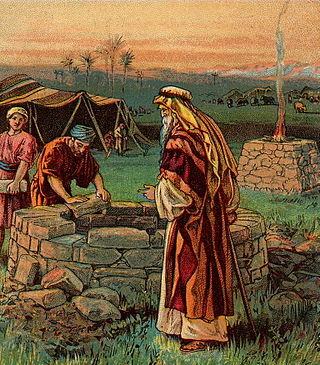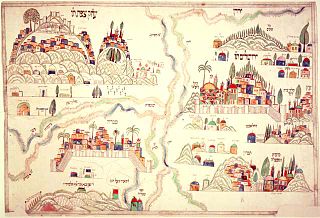
Abraham is the common Hebrew patriarch of the Abrahamic religions, including Judaism, Christianity, and Islam. In Judaism, he is the founding father of the special relationship between the Jews and God; in Christianity, he is the spiritual progenitor of all believers, whether Jewish or non-Jewish; and in Islam, he is a link in the chain of Islamic prophets that begins with Adam and culminates in Muhammad.

Isaac is one of the three patriarchs of the Israelites and an important figure in the Abrahamic religions, including Judaism, Christianity, and Islam. He was the son of Abraham and Sarah, the father of Jacob and Esau, and the grandfather of the twelve tribes of Israel.

Jacob, later given the name Israel, is regarded as a patriarch of the Israelites and is an important figure in Abrahamic religions, such as Judaism, Samaritanism, Christianity, and Islam. Jacob first appears in the Book of Genesis, originating from the Hebrew tradition in the Torah. Described as the son of Isaac and Rebecca, and the grandson of Abraham, Sarah, and Bethuel, Jacob is presented as the second-born among Isaac's children. His fraternal twin brother is the elder, named Esau, according to the biblical account. Jacob is said to have bought Esau's birthright and, with his mother's help, deceived his aging father to bless him instead of Esau. Later in the narrative, following a severe drought in his homeland of Canaan, Jacob and his descendants, with the help of his son Joseph, moved to Egypt where Jacob died at the age of 147. He is supposed to have been buried in the Cave of Machpelah.

The biblical Book of Genesis speaks of the relationship between fraternal twins Jacob and Esau, sons of Isaac and Rebecca. The story focuses on Esau's loss of his birthright to Jacob and the conflict that ensued between their descendant nations because of Jacob's deception of their aged and blind father, Isaac, in order to receive Esau's birthright/blessing from Isaac.

Hebron is a Palestinian city in the southern West Bank, 30 kilometres (19 mi) south of Jerusalem. Nestled in the Judaean Mountains, it lies 930 metres (3,050 ft) above sea level. The second-largest city in the West Bank, and the third-largest in the Palestinian territories, it had a population of 201,063 Palestinians in 2017, and seven hundred Jewish settlers concentrated on the outskirts of its Old City. It includes the Cave of the Patriarchs, which Jewish, Christian, and Islamic traditions all designate as the burial site of three key patriarchal/matriarchal couples. The city is often considered one of the four holy cities in Judaism as well as in Islam.
Abel-mizraim is a place "beyond," or east, of the Jordan river, at the "threshing-floor of Atad(גֹּרֶן הָאָטָד)." Here Joseph and his 11 brothers and the Egyptians mourned seven days for Jacob. Its exact site is unknown.
Aholibamah, is an eight-time referenced matriarch in the biblical record.
Amariah means "promised by God" in Hebrew. It was commonly used as a name of priests in the History of ancient Israel and Judah. It appear several times in the Hebrew Bible:
- One of the descendants of Aaron by Eleazar. He was probably the last of the high priests of Eleazar's line prior to the transfer of that office to Eli, of the line of Ithamar.
- A Levite, son of Hebron, of the lineage of Moses.
- A "chief priest" who took an active part in the reformation under Jehoshaphat ; probably the same as mentioned in 1 Chronicles 6:9.
- An ancestor of Ezra.
- One of the high priests in the time of Hezekiah.
- Great-grandfather of Zephaniah.
- Great-grandfather of Athaiah.
- One of the persons who sealed the covenant.
- One of the persons who had taken 'strange wives'.
Anab is a city mentioned in the Hebrew Bible. It is mentioned in the Book of Joshua as one of the cities in the Judaean Mountains from which Joshua expelled the Anakim.
Anakim are mentioned in the Bible as descendants of Anak.

The Cave of the Patriarchs or Tomb of the Patriarchs, known to Jews by its Biblical name Cave of Machpelah and to Muslims as the Sanctuary of Abraham, is a series of caves situated 30 kilometres (19 mi) south of Jerusalem in the heart of the Old City of Hebron in the West Bank. According to the Abrahamic religions, the cave and adjoining field were purchased by Abraham as a burial plot, although most historians believe the Abraham-Isaac-Jacob narrative to be primarily mythological. The site is considered a holy place in Judaism and Islam.

Sarah is a biblical matriarch, prophetess and major figure in Abrahamic religions. While different Abrahamic faiths portray her differently, Judaism, Christianity, and Islam all depict her character similarly, as that of a pious woman, renowned for her hospitality and beauty, the wife and half-sister of Abraham, and the mother of Isaac. Sarah has her feast day on 1 September in the Catholic Church, 19 August in the Coptic Orthodox Church, 20 January in the LCMS, and 12 and 20 December in the Eastern Orthodox Church.

Caleb, is a figure who appears in the Hebrew Bible as a representative of the Tribe of Judah during the Israelites' journey to the Promised Land.
According to the Book of Joshua, Adonizedek was king of Jerusalem at the time of the Israelite invasion of Canaan. According to Cheyne and Black, the name originally meant "Ṣedeḳ is lord", but this would likely have been read later as meaning "lord of righteousness" or "my lord is righteousness".
Anak is a figure in the Hebrew Bible. His descendants are mentioned in narratives concerning the conquest of Canaan by the Israelites. According to the Book of Numbers, Anak was a forefather of the Anakim, a Rephaite tribe according to Deuteronomy 2:11. In their report, ten of the twelve Israelite spies associated the Anakim with the Nephilim of Genesis 6:1–4.
Ahiman is the name of two persons in the Bible:

Enos or Enosh is a figure in the Book of Genesis in the Hebrew Bible. He is described as the first son of Seth who figures in the Generations of Adam, and is also referred to within the genealogies of 1 Chronicles.

The Four Holy Cities of Judaism are the cities of Jerusalem, Hebron, Safed and Tiberias, which were the four main centers of Jewish life after the Ottoman conquest of Palestine.
Eshcol is a term in the Hebrew Bible. It may refer to:









